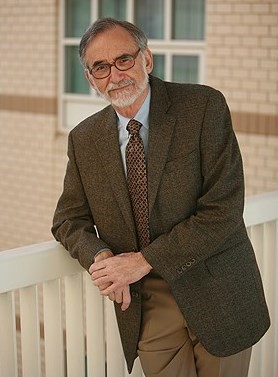
Charles Arthur Lave
Professor of Economics
Charles Arthur Lave died May 2, 2008, at home in Irvine, California, of complications from myelodysplastic syndrome.
Charlie received a BA from Reed in political science and economics and a PhD from Stanford University in economics. In 1966, he married Jean Carter. Their daughter, Rebecca Lave, who provided the details for this memorial, was born in 1970; the couple divorced in 1973. In 1990, he married longtime partner Bethany Mendenhall.
Charlie was a transportation economist at University of California, Irvine, best known for his influential work on the effects of the 55 m.p.h. speed limit, the economics of public transportation, and transportation safety, topics on which he published more than 100 papers over his 42–year career at UCI. He also wrote about transportation in Newsweek, the Wall Street Journal, the New York Times, and the Atlantic Monthly, and appeared on the television program 60 Minutes. He served on 12 National Research Council Transportation Research Board committees, and chaired the State of California Blue Ribbon Commission on the safety effects of emission standards. Charlie was cofounder of the UC Transportation Center, and the editor of its journal, Access; he was a member of the editorial board of three other transportation journals. He served on the board of directors of the National Bureau of Economic Research (1991-97).
A highly respected member of the UCI community, serving four terms as chair of the economics department and four terms as chair of the faculty of the School of Social Sciences, Charlie received two campus-wide awards for his contributions to teaching and research and was a superb teacher and mentor, noted for his ability to help students and colleagues clarify and sharpen their thinking. A dedicated member of the UCI community, Charlie made faculty and staff housing on the campus his primary project over the last 25 years, and served as chairman of the board of the Irvine Campus Housing Authority from 1983 to 1997.
After his retirement in 1999 as emeritus professor, he and his wife traveled around the world. Rebecca writes: “I can't think how to summarize his attachment to Reed . . . he cared about it so very much.” Charlie was elected by the Reed alumni association to serve as an alumni trustee from 1978 to 1982; he did interviews with prospective students, hired Reed graduates in the School of Social Sciences at UCI, regularly attended Reunions, and donated to the college yearly in memory of his friends. He once wrote that his strongest Reed memories included the feeling in his freshman year that he was finally with people who were like him, “followed by the feeling that my only redeeming characteristic, intelligence, didn't look very special compared to them. Then, the feeling at graduation that I'd never again be in a group of people, or a community, that I cared about so deeply- A correct prediction, though I've spent major amounts of time trying to create such a community.” Steve Piker wrote that Charlie had “a sense of humor that combined intelligent and caustic wit with just the right amount of self deprecation, enabling others enjoyably to share chuckles with Charlie; 110 percent intellectual integrity, which included a superb, disciplined, always empirically oriented capacity for constructing lines of reasoning, which enabled Charlie often to make prima facie dubious or even down right objectionable points of view palpably worthy of serious consideration; and, suffusing everything Charlie did and said, bone marrow deep and warm interest in and appreciation of others, effortlessly and unfailingly conveyed, which—finally—is the main reason that Charlie was a treasured soul mate to so many.”
Survivors include his wife; daughter; granddaughter; sister; and brother, Lester B. Lave. Appeared in Reed magazine, November 2008:
Charles A. Lave was a pioneer in transportation economy and a driving force behind the social science programs at the University of California, Irvine (UCI). Lave began his academic career at UCI in 1966 as one of the first faculty members in the School of Social Science. Although he spent his entire academic career at UCI, he also held visiting faculty positions at other universities, including MIT, Harvard, Berkeley, and Stanford. Lave served UCI throughout his career; he co-founded the Institute of Transportation Studies, served as faculty chair four times, and served as chair of the Economics Department four times. Lave was also instrumental in establishing UCI's faculty housing, University Hills, and served as its first chairman of the board of directors. Lave served on almost every Academic Senate committee, frequently as chair or co-chair. He served as the vice-chair and faculty representative to the design committee for UCI's Social Science Plaza buildings. Lave was also very concerned with improving students' abilities to communicate clearly and, to that end, was very active on UCI's Writing Task Force.
Lave oversaw the design and approval of UCI's Ph.D. program in Economics, followed later by its innovative Ph.D. programs in Transportation Science and Transportation Economics. An expert in energy use, he was also known for his carefully reasoned opposition to rail transit systems and the practice of reducing speed limits to reduce transportation energy consumption. Lave also played a major role in an influential National Research Council Report on the energy and safety impacts of U.S. light duty vehicle fuel economy standards.
Lave was an early proponent of interdisciplinary research and co-authored several papers with anthropologists and engineers. He also co-authored an introductory textbook on interdisciplinary social science studies. Lave remained active after his retirement from UCI in 1999. His extraordinary service and accomplishments were recognized through the UCI Alumni Association's Extraordinarius Award in 1993 and the Daniel G. Aldrich Distinguished University Service Award in 2000.
David Brownstone
Professor of Economics
